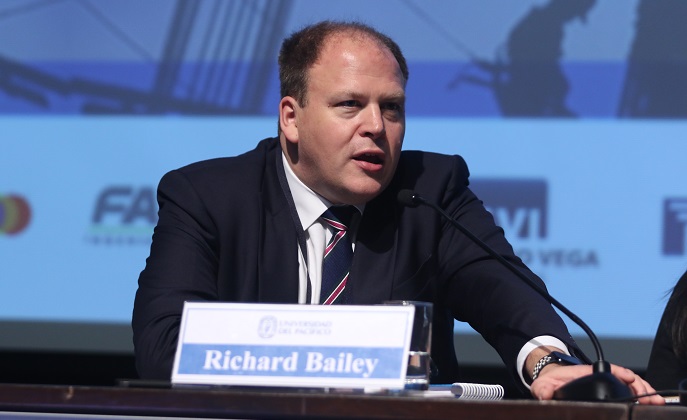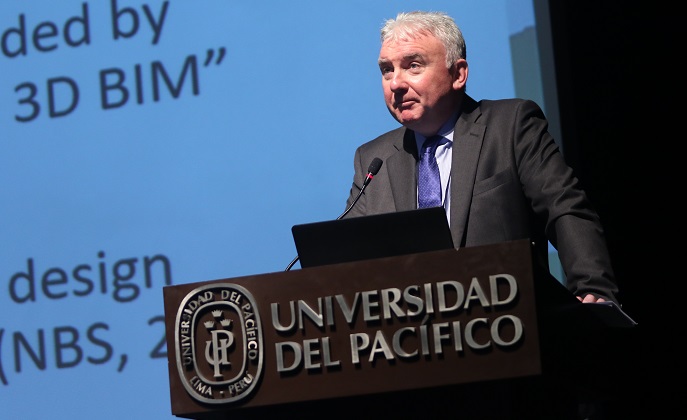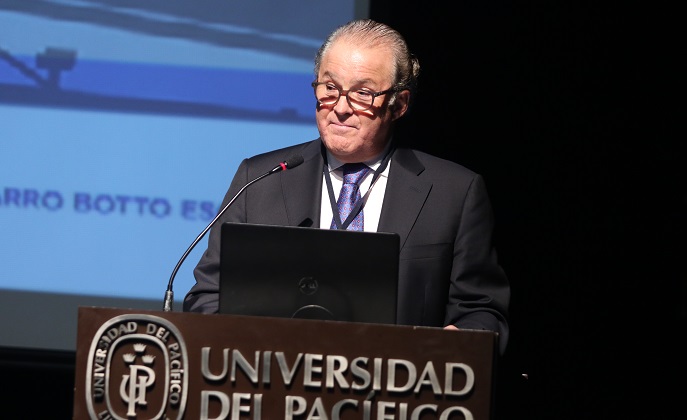The construction industry is one of the most important in our economy and is also one of the most affected by corruption worldwide. Connoisseurs of this panorama, Universidad del Pacífico (UP) Law School and the Society of Construction Law - Peru held the III International Congress of Construction Law - CIDEC 2018, at the University premises on November 22 and 23.
The objective of the event was to present current trends in the contracting of NEC models for large infrastructure projects; as well as sharing good corporate integrity and Compliance practices focused on the construction industry; through the panels and presentations by distinguished speakers from the construction area worldwide.
The congress began with the welcome words by Dr. Fernando Cantuarias, Dean of Universidad del Pacífico Law School, who highlighted the desire to encourage reflection and academic analysis of an activity as important as construction in this congress through the participation of public and private officials, as well as lawyers dedicated to this sector of the economy. He also stressed that this event is the last one held by the School in the framework of its 10th anniversary.
For his part, Dr. Gustavo Paredes, Vice President of the Society of Construction Law - Peru, also welcomed participants to the event, and noted that it would be divided into two thematic areas. On the one hand, a necessary collaborative approach aimed at achieving efficient projects, and on the other, transparency and corporate integrity as a substantial basis for restoring confidence in the industry.
"The keynote speakers will show us that this is possible, that it is possible to structure effective cooperative relationships, that it is possible to technologically dynamize projects with intelligent information, but it is also possible to do so within the framework of good corporate practices to fight corruption," said Paredes.
Trends in Construction Law
The current trend in contractual design is collaboration. This was explained by Richard Bailey, partner at Goodman Derrick LLP, who revealed the typical features of a collaborative contractual design and the philosophy of the British New Engeeniring Contracts (NEC).
For Bailey, the NEC contracts are a mechanism that stipulates - mainly - the good management of the project, where risk management is proactive, communication is open and there is a willingness to work together to solve the problem, whatever the cause.
"It seems to me that there has been a great desire (for a change towards collaborative work) - maybe it's something strange for a lawyer, who comes from a system whose nature is confrontation, to say; however, the construction industry has started to separate from this way of seeing things, where one focused on money; now it's about being able to work to finish jobs on time and within budget", said Bailey about the motivation that led the construction industry to bet on NEC contracts for large projects.

Richard Bailey, partner at Goodman Derrick LLP.
On the other hand, in terms of the trends in the management of construction projects, Paul Trayce, a full professor at the University of Salford (Manchester, United Kingdom), explained how construction is breaking the inertia of technological lag, through the use of Building Information Modeling technological platforms - BIM.
"Without technology, we cannot achieve this improvement, this collaboration, this productivity, but what I suggest not to do is place technology at the beginning of all this. Creating the information model is a verb, it is about doing things in a different way. So, please, remember: creating information has to do with the whole process, not just the digital model", Trayce emphasized in relation to one of the vital points of the BIM implementation.
 Paul Trayce, full professor at the University of Salford, Manchester - United Kingdom.
Paul Trayce, full professor at the University of Salford, Manchester - United Kingdom.
Finally, regarding the fight against corruption, Robert Peckar, partner at Peckar & Abramson LLP, shared his international experience in addressing this issue, by promoting transparency and the development of compliance programs applied to the sector.
In this regard, he noted that, according to Neill Stansbury, Co-founder and Director of the Global Infrastructure Anti-Corruption Centre, among the characteristics that make the construction industry prone to corruption are:
- Singularity: there are no two projects that are the same, which makes comparisons difficult and leads to inflating costs to hide bribes.
- Complex transaction chains: with so many gears it is difficult to establish control.
- Official bureaucracy: opens the door to bribery in an industry where the costs of bureaucratic delays and interference are significant.
Likewise, he highlighted that the institutional repository of Loughborough University and other sources have also written about corruption in construction projects and have identified additional features that lay the foundations for corruption:
- Competition degree.
- A large number of contractual links between employers and contractors, and contractors and subcontractors, between subcontractors and suppliers, etc.
- Requirement for numerous permits and government approvals.
- Unique character of the project.
- Opportunities for delays and cost overruns.
- Possibility of hiding the quality of work.
- The urgency of certain projects, the speed with which the money is spent and the lack of controls.
- The culture of secrecy, in which costs are kept secret under the excuse of confidentiality.
- The cost of perceived integrity. Some companies reluctantly accept bribes and corruption to keep up with the competition.
---
In this line, he pointed out that the political consequences and the performance of the justice systems in the countries affected by corruption in the construction sector, such as the Odebrecht case, show that times have changed and are no longer sustainable.
"It's a different world, a world in which corruption is seen as evil as it is. And the call to the people involved in it to account for their actions gives hope to those people who want to see this industry free from all corruption," Peckar said.
Finally, he pointed out that the key to a corporate anti-corruption program lies in the involvement of the leaders of the organization, as well as in the unity of a message among all its members, so that no one has any doubts about the company's policies. He also highlighted his optimism in younger generations, who are interested in the reputation of their countries and their workplaces, so - for him - it would be them who will drive the fight against corruption.
 Robert Peckar, partner at Peckar & Abramson, LLP.
Robert Peckar, partner at Peckar & Abramson, LLP.